Tunisia wants you to believe it is a progressive nation that protects human rights. It is, in fact, a police state that aggressively silences anyone who challenges President Ben Ali.
SFAX, Tunisia
A large photo of President Zine El Abidine Ben Ali smiled assuredly from the whitewashed facade of Sfax Prison, where Slim Boukhdhir was serving a one-year jail term. Officially, the 37-year-old journalist was behind bars for insulting a police officer at a checkpoint in Sfax, Tunisia’s second largest city. But in the Orwellian reality of this sunny North African nation, Boukhdhir’s incarceration had little to do with disrespecting police and everything to do with offending the man in the photo.
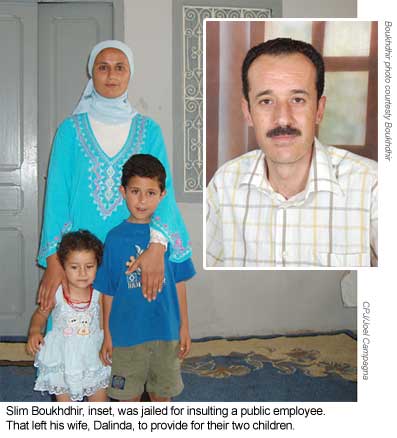 Boukhdhir, a one-time arts and culture writer with the pro-government press, did what few Tunisian journalists dare: He criticized Ben Ali and his family members, who dominate political and economic life in Tunisia, a Mediterranean country of 10 million. Boukhdhir’s freelance pieces, published online and for foreign publications, accused Ben Ali of nepotism such as funneling state money to a private school run by a niece. Boukhdhir quickly attracted the attention of the authorities. He was dismissed from his day job at the newspaper Akhbar al-Jumhuriyya under government pressure, was refused a passport, and on one occasion was assaulted by secret police in downtown Tunis shortly after writing an online piece criticizing the business practices of Ben Ali’s son-in-law. Undeterred, Boukhdhir kept writing.
Boukhdhir, a one-time arts and culture writer with the pro-government press, did what few Tunisian journalists dare: He criticized Ben Ali and his family members, who dominate political and economic life in Tunisia, a Mediterranean country of 10 million. Boukhdhir’s freelance pieces, published online and for foreign publications, accused Ben Ali of nepotism such as funneling state money to a private school run by a niece. Boukhdhir quickly attracted the attention of the authorities. He was dismissed from his day job at the newspaper Akhbar al-Jumhuriyya under government pressure, was refused a passport, and on one occasion was assaulted by secret police in downtown Tunis shortly after writing an online piece criticizing the business practices of Ben Ali’s son-in-law. Undeterred, Boukhdhir kept writing.
So, in November 2007, the Ben Ali government sent him a stronger message. As the journalist headed from Sfax to Tunis after being told he could at last collect his passport, police stopped his cab outside the city and ordered him out of the car. The officers accused Boukhdhir of insulting them, a charge the writer vigorously denied, and then took him to a police station where they punched him repeatedly in the head and accused him of being an American agent, the journalist told CPJ.
The government said Boukhdhir’s arrest had nothing to do with journalism. A week later, after a farcical trial, he was convicted of insulting a public employee and refusing to hand over identification to a police officer. A witness told Boukhdhir’s family that police falsified his statements to incriminate the journalist. The judge at Boukhdhir’s trial prohibited the government’s witnesses from being cross-examined. The one-year sentence was not only the maximum allowed by law, it was unheard of for such an offense, defense lawyers said.
| Also in this report | |
| Recommendations | |
| What Congress says | |
| Print-friendly version | |
| Audio slideshow | |
| Version française | |
They sent him to prison in order to terrorize him, said human rights lawyer Mohammed Abbou, himself jailed in 2005 for online articles criticizing Ben Ali. Following an intensive international campaign by journalists and press freedom groups, including CPJ, Tunisian authorities released Boukhdhir in July, citing good behavior, but his imprisonment illustrates the harsh and elaborate measures Tunisia’s government uses to stifle media dissent while trying to insulate itself from international criticism.
Known across the world for its stunning beaches and tourist locales, Tunisia quietly operates a police state at home. The print press does not criticize the president and is largely paralyzed by self-censorship. The few critical voices who do write on the Internet, for foreign publications, and for low-circulation opposition weeklies are regularly harassed and marginalized by the Tunisian authorities.
Tunisia’s press code outlines an array of coverage restrictions, including outright bans on offending the president, disturbing public order, and publishing what the government deems false news. While such laws have been used to prosecute journalists over the years, authorities prefer to use more subtle tactics to keep those voices in check, a CPJ investigation found. They control the registration of print media and licensing of broadcasters, refusing permission to critical outlets. They control the distribution of government subsidies and public sector advertising, thus wielding an economic weapon. Outspoken newspapers are subject to confiscation by police. Critical online news sites, those belonging to international rights groups, and the popular video-sharing site YouTube are blocked by the government.
Independent journalists, some of whom double as human rights activists, have also been targets of harassment. Their phone lines are cut, they receive anonymous threats, they are placed under police surveillance, they are denied the right to travel outside the country, and even their movements inside the country have been curtailed. Those who exceed the authorities’ acceptable boundaries for criticism are targeted with harsher measures such as imprisonment or violent attack. In one notorious 2005 case, Christophe Boltanski of the French daily Libration was pepper sprayed, beaten, and stabbed by four unidentified men in the highly patrolled diplomatic quarter of Tunis. The attack came just days before a U.N.-sponsored summit on the Internet, and right after Boltanski wrote an article describing persecution of human rights activists. In strikingly similar circumstances, Tunisian journalist Riad Ben Fadhel was wounded in a 2000 drive-by shooting outside his home in Carthage, a spot within miles of the presidential palace, one of the most secure areas in the country. Days before, he had written an article for Le Monde urging Ben Ali to step down after his term expired.
Tunisia and Morocco have jailed more journalists than any other nation in the Arab world since 2002. Tunisian authorities have used charges unrelated to journalism as a way to protect themselves from international scrutiny. (Such charges extend beyond journalism. In February, authorities imprisoned comedian Hedi Ould Baballah on what were widely viewed as trumped-up drug charges after he imitated Ben Ali in an unflattering skit.) There are a lot of invisible, indirect pressures, said one veteran Tunisian journalism teacher, who spoke only on condition of anonymity. There are no official orders to close papers down or jail journalists. But you ask yourself, where is the independent press?
Internationally, the government employs an aggressive public relations strategy. The regime provides expense-paid junkets to regional journalists to cover official events such as the annual commemoration of the November 1987 coup that brought Ben Ali to power, journalists told CPJ. The Cairo-based Arab Network for Human Rights Information (ANHRI) reported in 2007 that Egyptian journalists were paid to produce stories praising Ben Ali’s democratic reforms and leadership skills.
Authorities aggressively counter criticism at international forums by recruiting spoilers. In September 2007, one such group sought to dominate the discussion at a Johns Hopkins University event featuring journalist and human rights activist Sihem Bensedrine. When criticism is published in international newspapers, government spokespeople respond swiftly. Since President Ben Ali’s accession to power in 1987, Tunisia has implemented a progressive but irreversible reform process aiming at anchoring democracy, strengthening the rule of law, and promoting and protecting human rights, wrote Taoufik Chebbi, press counselor to the Tunisian embassy in Washington, in a letter to the St. Paul Pioneer Press that followed a CPJ account of press freedom abuses. Chebbi said reforms have spectacularly changed the political landscape.
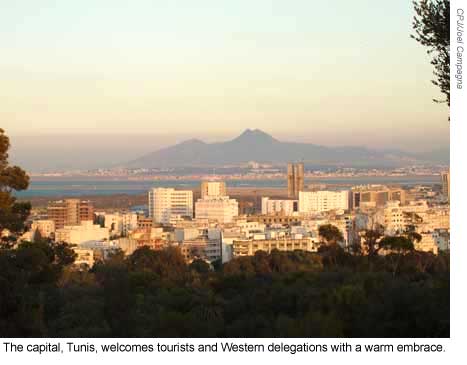
Those changes, however, do not include direct engagement with those critical of the government’s record. Top officials, from Prime Minister Mohamed Ghannouchi to Interior Minister Rafik Belhaj Kacem, ignored numerous requests from CPJ to meet in Tunisia in June and July to discuss press freedom abuses.
Seen as a bulwark against Islamist militancy in North Africa, Ben Ali enjoys strong relations with the United States and Europe. The U.S. State Department and President George W. Bush have occasionally taken the government to task for its human rights record, but Tunisia is a trusted partner in the U.S. war on terrorism and has impressed U.S. supporters with its economic growth, support for women’s rights, and political stability. Many of its U.S. supporters are members of Congress, particularly those serving on the recently formed Tunisia Caucus, which is tasked with boosting bilateral relations. The Tunisian government regularly welcomes Congressional delegations to the sunny capital of Tunis. As members of Congress push for closer U.S.-Tunisian ties, they typically remain silent about Tunisia’s poor human rights and press freedom record while allowing Tunisia’s state-controlled press to exploit their visits for propaganda.
In the latest example, U.S. Rep. Betty McCollum, a Democrat from Minnesota, praised Tunisia during a July visit as a voice of moderation and wisdom in the world, a statement that was trumpeted in the pro-government press. Tunisian journalists and analysts say this type of political support is the foreign assistance the regime wants most.
(In a piece published on The Hill Web site, McCollum said she spoke privately with human rights groups but her trip focused on security cooperation and counterterrorism.)
Tunisia’s ties with France, its leading trade partner, run deeper still. Like predecessor Jacques Chirac, French President Nicolas Sarkozy has warm relations with Ben Ali, declaring during an April visit to Tunis: In a country where I come as a friend and I am received as a friend, I do not see why I would take it upon myself to give lessons. Although the European Union occasionally criticizes Tunisia on human rights, its political and economic interests override concerns about the government’s human rights abuses.
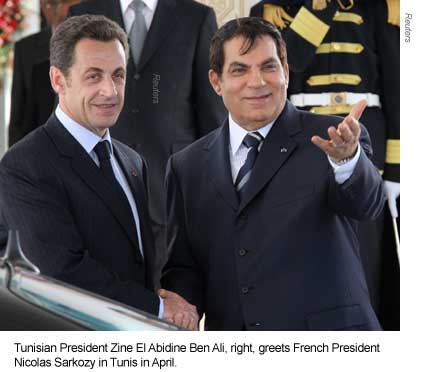 Today, many of Tunisia’s skilled journalists lament the sorry state of their profession, noting the gap between their country and neighbors such as Algeria and Morocco, where a vocal press has taken hold despite severe government repression. In several cases documented by CPJ, prominent Tunisian journalists have left the country to find work with international news organizations.
Today, many of Tunisia’s skilled journalists lament the sorry state of their profession, noting the gap between their country and neighbors such as Algeria and Morocco, where a vocal press has taken hold despite severe government repression. In several cases documented by CPJ, prominent Tunisian journalists have left the country to find work with international news organizations.
They used to assassinate journalists in Algeria, but in Tunisia they murdered the profession, said Taoufik Ben Brik, a 48-year-old independent journalist, referring to a murderous campaign by armed groups in Algeria in the 1990s. A harsh critic of Ben Ali, Ben Brik now writes for international news outlets.
It was only over the last four years that Slim Boukhdhir, once a veteran of the pro-government press, turned a critical eye toward the Ben Ali administration. By the time he was jailed, Boukhdhir was writing several times a week for officially banned Web sites such as the popular Tunisnews, and occasionally for the opposition weekly Al-Mawkif and the London-based daily Al-Quds al-Arabi. Slim represents what they are afraid of, said long-time independent journalist Neziha Rejiba. He went from being an ordinary journalist in Tunisia to an independent one. What happened to him is a way [for the government] to teach others.
Ben Ali has honed this containment strategy over two decades. The modern republic of Tunisia has known only two presidents since its independence from France in 1956. Habib Bourguiba, the nationalist hero and president for life, led Tunisia’s modernization and development over the course of 31 years. Under his autocratic hand, the country was hardly a liberal democracy, but he did permit a modest amount of political discourse in opposition and independent newspapers. As Bourguiba’s leadership became more erratic in his final years in power, the leeway for critical debate shrank as closings and censorship of newspapers grew.
When then-Prime Minister Ben Ali deposed Bourguiba, Tunisians felt a sense of optimism as political prisoners were freed and elections were promised. From 1987 to 1989 there was a kind of [political] spring in Tunisia, said Rachid Kechana, the editor of Tunisia’s opposition weekly newspaper Al-Mawkif. There were elections coming up and people thought they were experiencing pluralism. But it was a deception. After this, the state became more authoritarian and the press was the first casualty.
Ben Ali cracked down first on Islamist opposition and then on anyone who disagreed with the regime. Critical independent and opposition newspapers such as Le Maghreb, Badil, and the Islamist weekly Al-Fajr were shuttered outright or forced to close under government pressure. The publisher of Al-Rai, for example, closed the independent weekly under pressure after Rejiba wrote a column questioning Ben Ali’s political skills and expressing doubts about his democratic intentions.
Ben Ali’s government has largely succeeded in taking the life out of the country’s journalism. The mainstream print press is dominated by pro-government publications that offer fawning coverage of Ben Ali, praising him as an architect of change and a promoter of liberty. A 2007 U.S. State Department report found that even nominally private media take direction from senior government officials and that all media were subject to significant governmental pressure over subject matter. Front pages feature a daily photo of a beneficent Ben Ali, sometimes meeting with a foreign dignitary and sometimes simply in portrait. The inside pages are heavy with social news and sports. The occasional criticism is general and avoids mentioning officials by name or faulting government policies. In June, as Tunisians in the southern town of Redeyef were demonstrating against unemployment and the rising cost of living, front page news in the daily press was dominated by Tunisian students who passed their baccalaureate exams.
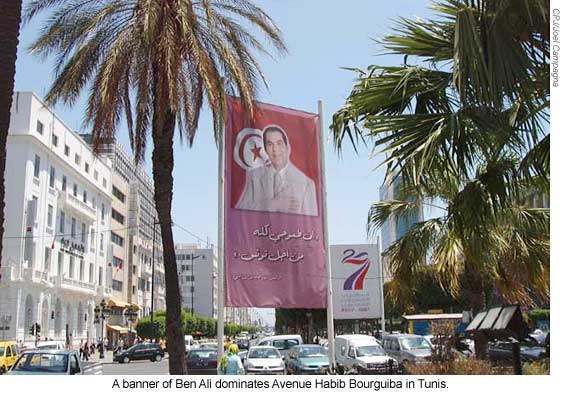
The Interior Ministry registers all print media, denying approval to titles perceived as independent. This decade, the government set up the National Frequencies Agency to license private broadcasters, but its approval criteria have never been disclosed, and several independent applicants have never even gotten a response from the agency, CPJ found. The agency has licensed one television station and three radio broadcasters, but all are owned by business interests close to the regime. Even so, the licenses bar the stations from broadcasting any political news except bulletins from the government news agency.
Always on the minds of journalists is whether the authorities will accept what they write. They never talk about what the readers want. Sometimes there is criticism in the daily press, but it’s not directed at the main decision-makers, said one senior journalist working for the pro-government press. He spoke on condition he not be identified, citing fear of retribution.
The fear is well-grounded. The government, through the Tunisian External Communication Agency (ATCE), distributes advertising from government agencies and publicly owned companies, and punishes outspoken newspapers by withholding advertising, journalists told CPJ. Private advertisers typically follow suit when the government pulls advertising, these journalists said. The ATCE operates opaquely: It doesn’t disclose guidelines on how it doles out ads, and ATCE Director General Oussama Romdhani did not respond to CPJ’s repeated calls seeking comment.
Despite this long record of hindering the press, Ben Ali frequently issues disingenuous calls for an end to self-censorship. We have constantly considered freedom of expression as a fundamental human right, Reuters quoted Ben Ali as saying in May. We reiterate our call to redouble efforts … to diversify and enrich spaces of dialogue in the various media to guarantee a developed and audacious national information … away from all forms of self-censorship and external censorship.
Raouf Cheikhrouhou, manager of the Dar al-Sabah media company and one of the few pro-government news executives who agreed to meet with CPJ, defended his publications and said they were independent. Asked why his newspapers, which include the influential 40,000-circulation daily Al-Sabah, do not look into government corruption or criticize high level officials, he blamed the law. Here in Tunisia there is a press law and you cannot go outside the law, he said. Under the law we cannot offend the president. Tunisia is not Europe. It is an Arab, Muslim country. We are going step by step and I think the press is going the right way.
When pro-government papers do undertake aggressive journalism, it often entails smearing independent reporters and activists. Newspapers such as the leading circulation daily Echourouk, the weekly Assarih, and the weekly Al-Hadath frequently publish baseless personal attacks on journalists, calling them traitors and foreign agents. Editors from these papers did not respond to CPJ’s calls seeking comment.
At the other end of the spectrum from the well-funded pro-government press are tiny opposition papers and online publications that face enormous obstacles. Collectively, their circulation is about 30,000 copies weekly (the pro-government tabloid daily Echourouk reportedly distributes 80,000 alone), they cost more to buy, and they all face limits in their political coverage.
In practice, only two opposition newspapers the weeklies Al-Mawkif, which belongs to the Progressive Democratic Party, and Mouatinoun, affiliated with the Democratic Forum for Labor and Liberties, have what could be considered a consistently aggressive editorial policy. The others depend on government subsidies to the tune of about 90,000 Tunisian dinars (US$75,000) annually, are handed lucrative advertising from government agencies and public-owned companies, and are politically tame as a result.
Rachid Kechana, the affable editor of Al-Mawkif, has been waging a constant battle to publish his weekly since it reappeared on newsstands in 2001 following a seven-year hiatus. Kechana, with the help of five staffers, fills his papers’ pages with stories not found in the rest of the press, reports from human rights groups criticizing the government’s record, articles about questionable land deals by government officials, and stories about rising food prices. He has done it all on a shoestring budget. Unlike most other opposition papers, Al-Mawkif doesn’t receive government subsidies (under the law, parties must have active representatives in parliament and his does not), and has been largely blacklisted by advertisers. As a result, the paper survives on its newsstand sales, and Kechana, who doubles as Tunis correspondent for the London-based daily Al-Hayat, is unable to take a salary.
Still, the paper has grown from four to 12 pages, its print run has increased tenfold to 10,000 copies, and it has grown bolder in its news coverage. With the paper’s rising influence has come increased government pressure, and that has caused new problems. Dependent on newsstand sales, Al-Mawkif can be crippled financially whenever the government decides to interfere. Every week, we have to calculate the risk. When we choose a headline, we have to think how much it will antagonize the government, Kechana said.
The paper found out in March, when it ran a series of tough stories on human rights abuses, a questionable deal involving a businessman close to Ben Ali, and the long-shot presidential candidacy of the Progressive Democratic Party’s former head, Nejib Chebbi. Soon after, copies of the newspaper began to disappear from kiosks. Over a four-week period in March and April, vendors reported that secret police scooped up copies in bulk, Kechana said. Al-Mawkif also discovered large numbers of copies undistributed in the offices of its circulation contractor, Sotupresse. Al-Mawkif records show a drastic drop in sales, reaching a low of 744 copies in one week. Sotupresse Director General Saleh Nouri denied suggestions that copies were being withheld, saying his company operates freely. Tunisian officials would not meet with CPJ to comment on the case.
At the same time copies were being taken out of circulation, Al-Mawkif found itself the target of a 500,000-dinar (US$415,000) lawsuit brought by five Tunisian cooking oil distributors. The companies claimed the paper published false news in an opinion piece calling for an investigation into news reports that contaminated cooking oil was illegally exported to Algeria. The suit was brought by the companies although they were not named in the article and the commentary was based on a report in the Algerian daily Al-Khabar. Hassan al-Thabeet, the lawyer representing the companies, said they contacted him separately to file the suit and had not acted in concert. He declined other comment.
The outspoken weekly Mouatinoun, founded in 2007 as the mouthpiece of the Democratic Forum for Labor and Liberties, faces similar political and economic obstacles. The avuncular party head, Mustafa Ben Jaafar, who is also the paper’s director, publishes with a volunteer staff from a four-room apartment in downtown Tunis, selling about 1,000 copies per issue. He says he can get no advertising from public companies and that newspaper vendors hide his paper in their kiosks. Plainclothes security agents sit outside the apartment building on watch. They are there 24 hours a day, Ben Jaafar said. This is a form of intimidation for ordinary citizens.
For the image-conscious government, marginalizing these papers is preferable to shutting them down. The government needs Al-Mawkif to show the world that it has an open media, when in reality it is completely restricted, says Lotfi Hajji, Tunis correspondent for Al-Jazeera.
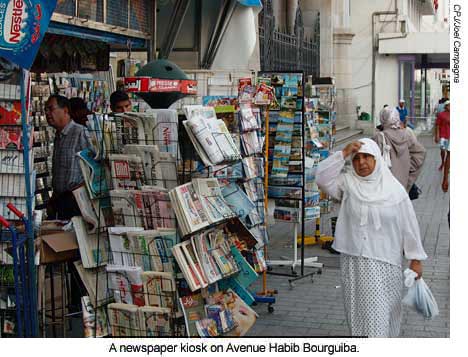
You can spot the offices of Kalima, just off of Al-Hurriya Street, by the security agents planted in plastic chairs opposite the building 24 hours a day. Secret police aside, Kalima is not your average Tunisian news outlet. Founded in 2000 by the journalist-activist Sihem Bensedrine, Kalima publishes biting critiques in Arabic and French of Ben Ali and his family, as well as stories about torture and human rights abuses. Its cramped, poorly lit office also serves as headquarters for the National Council for Liberties in Tunisia (CNLT), a local human rights group, and the press freedom group the Observatory for the Freedom of Press, Publishing, and Creation.
This year, for the fifth time in nine years, Bensedrine sought permission to produce a print edition of Kalima, but officials at the Ministry of Interior would not accept her application. Kalima still prints a few hundred unauthorized copies on a photocopy machine, but it mainly publishes on the Internet and by e-mail. The site is blocked in Tunisia, although it is widely read abroad.
Kalima is part of a small but growing samizdat electronic media that has emerged beyond the censors’ reach. Its aggressive approach to news and political commentary has made the paper the target of intensive harassment in the form of threats, intimidation, violent attacks, and jail. Bensedrine and Editor-in-Chief Neziha Rejiba say their offices are regularly burglarized; they return to work in the mornings to find computers turned on and files printed out. They want to show us we are not in a secure environment, Bensedrine said. As with other independent journalists, their e-mail accounts are infiltrated by malicious programs. Bensedrine’s entire e-mail queue once vanished after she clicked open an e-mail.
Bensedrine was imprisoned for six weeks in 2001 after discussing corruption and human rights abuses during a satellite television interview. She has been the target of numerous assaults, such as a 2004 attack in which presumed secret police agents punched her in the face and chest. And Bensedrine has been the target of scathing personal attacks in pro-government newspapers such as Ashourouq, Assarih, and Al-Hadath, which have called her a prostitute, a “creature of the devil,” and a “hateful viper.” One of those leading the attacks, Abdelhamid Riahi of Ashourouq, was later decorated by the president for cultural achievements.
Omar Mestiri, a human rights activist and the managing editor of Kalima, was the target of a spurious 2007 defamation lawsuit brought by Mohammed Baccar, a lawyer with close connections to state authorities. The case stemmed from a September 2006 article in which Mestiri criticized the Tunisian Bar Association’s decision to lift Baccar’s disbarment. The prosecution did not challenge the accuracy of the story but insisted that Mestiri reveal his sources. Baccar finally withdrew his complaint, but just a day later unknown arsonists torched the office of Ayachi Hammami, the human rights lawyer who defended Mestiri.
Even for enterprising Tunisian journalists, several types of stories are out of reach. Violent protests over unemployment and rising food costs rocked the southern mining town of Redeyef in January and continued in the ensuing months, but virtually no coverage followed. Journalists and activists said government forces had cordoned off the city and barred nonresidents and journalists from entering. In June, authorities detained reporter-activist Hadi al-Ridaoui for two days after he took pictures and interviewed wounded demonstrators at the hospital in nearby Gafsa.
You can write about sports all you want. But issues important to society, like the demonstrations in Redeyef, the press can’t do anything except print what the government wants, said Al-Jazeera correspondent Hajji.
Hajji’s situation reflects the severe limits the government is willing to place on the international press. The ATCE controls foreign reporters by requiring them to obtain government accreditation and then get explicit permission to cover any official event. As part of the Tunisian government’s longstanding feud with Al-Jazeera over its coverage of Tunisian dissidents, authorities have refused to accredit Hajji since 2004. Hajji has no office and is not authorized to cover the news, although he continues to file stories for Al-Jazeera’s Web site and send reports by e-mail. Hajji said police so often arrive at his meetings and interviews, it’s clear they monitor his phone conversations. In May, as Hajji was traveling to proceedings in the cooking-oil lawsuit against Kechana, police delayed him at a toll road until the hearing was over.
While many independent journalists are still working, others are losing hope. With Ben Ali set to run for a fifth term in 2009, they are bracing for a renewed clampdown designed to ensure the president’s smooth re-election to a new five-year term. There is no place for an independent media project today, said the Tunisian journalism teacher. Propaganda work, sure, he says. Business projects, absolutely. There will always be plenty of state money to burnish Tunisia’s international image.
But Hajji’s case, like those of Boukhdhir, Bensedrine, Kechana, and others, illustrates the government’s determination to control the news and to quash free expression. Until that situation changes, until Tunisia’s international allies speak up for change, the opportunity for political freedom will be severely limited.
Joel Campagna served as CPJ’s senior program coordinator for the Middle East and North Africa.